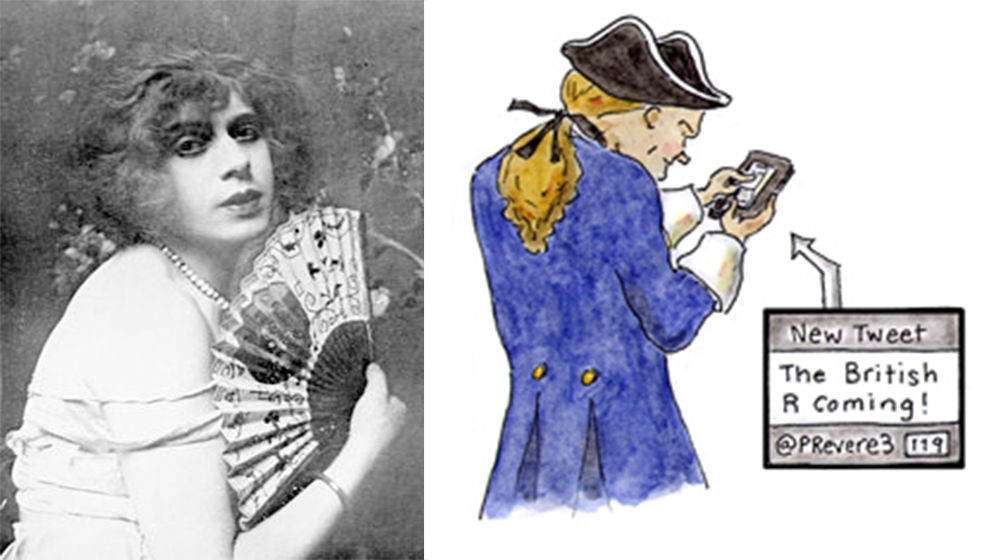archive
Undergraduate DH Courses for Spring 2019

Learn more about how digital sources and tools are changing how we study the American Revolution (HIST 361) and Transwomen in Literature (ENGL/WSGS 283E) in two great DH courses this spring semester!
ENGL/WSGS 283E Transwomen in Literature
Pamela Caughie, Professor of English
Class sessions: Tuesdays and Thursdays, 2:30-3:45 PM
In this engaged learning course, students will study transgender literature and history of the early 20th century and will assist in producing a digital scholarly edition and archive of one such narrative: Man into Woman, the life narrative of Lili Elbe, one of the first persons to undergo a surgical change in sex in 1930. (If you have seen the 2015 film, “The Danish Girl,” you have a sense of her life.) The primary work will be supplemented by essays on transgender history and on digital humanities; case studies by sexologists of the late 19th and early 20th centuries; and early 20th century novels, such as Virginia Woolf's Orlando (1928) and Radclyffe Hall's The Well of Loneliness (1928). Students will immerse themselves in this history to better understand and work with the primary text. In addition, all students will be trained in how to encode materials according to TEI (Text Encoding Initiative) standards, and how to collate editions.
Requirements: In addition to the readings, quizzes, and class discussions, students will:
- Participate in the production of the digital edition and archive, working approximately 10 hours per week on assigned tasks that they select in conjunction with the professor and the project manager. Tasks may include encoding materials in TEI mark-up; proofing materials; collating editions; transcribing materials for the archive; and researching specific events and names mentioned in the narrative and supplemental materials;
- Learn TEI mark-up language and practice encoding materials;
- Track their hours and their progress on assignments weekly in a google spreadsheet monitored by the project manager; and,
- Write blog posts reflecting on the work they did on the edition and what they learned from that process. Students will share these reflections and their final product (e.g., an encoded text, a sample collation, a glossary or index) in a project team meeting and at the Undergraduate Research Symposium in April.
HIST 361 The American Revolution: The Revolution Will Be Digitized
Kyle Roberts, Associate Professor of History and Director, CTSDH
Website: https://revolutionwillbedigitized.wordpress.com/
When British colonists in North America declared themselves independent from the British Crown in 1776, they affected the most successful revolution in modern history. To this day, historians continue to try to make sense of their actions. In this hands-on, project-based course we will use digital tools and sources to conduct research on primary sources, analyze and interpret our findings, and communicate our results. Prof. Benjamin Bankhurst (Shepherd University) and Prof. Kyle Roberts (Loyola University Chicago) are team-teaching this course simultaneously allowing Shepherd and Loyola students to hear lectures, engage in discussions, and participate on group projects in this innovative digital history class.
The course moves chronologically and thematically through life and events in America from 1763 to 1815. We will explore the question of political mobilization, focusing on the period from the Stamp Act crisis in March 1765 through the declaration of American independence in July 1776. Text mining writings of the period will help us better appreciate the importance of the spoken and written word to revolutionary upheaval. Digital mapping will help us explore on the ground a war that offered the promise of new opportunities for freedom, as well as the subsequent ways the creation of a new political order did not come easily. Finally, we will turn to the consequences of the Revolution, at home and abroad, by digitally reconstructing the losses sustained by a few of the 100,000 Loyalists who fled the new United States.
Class sessions: Tuesdays and Thursdays, 4:15-5:30 PM

